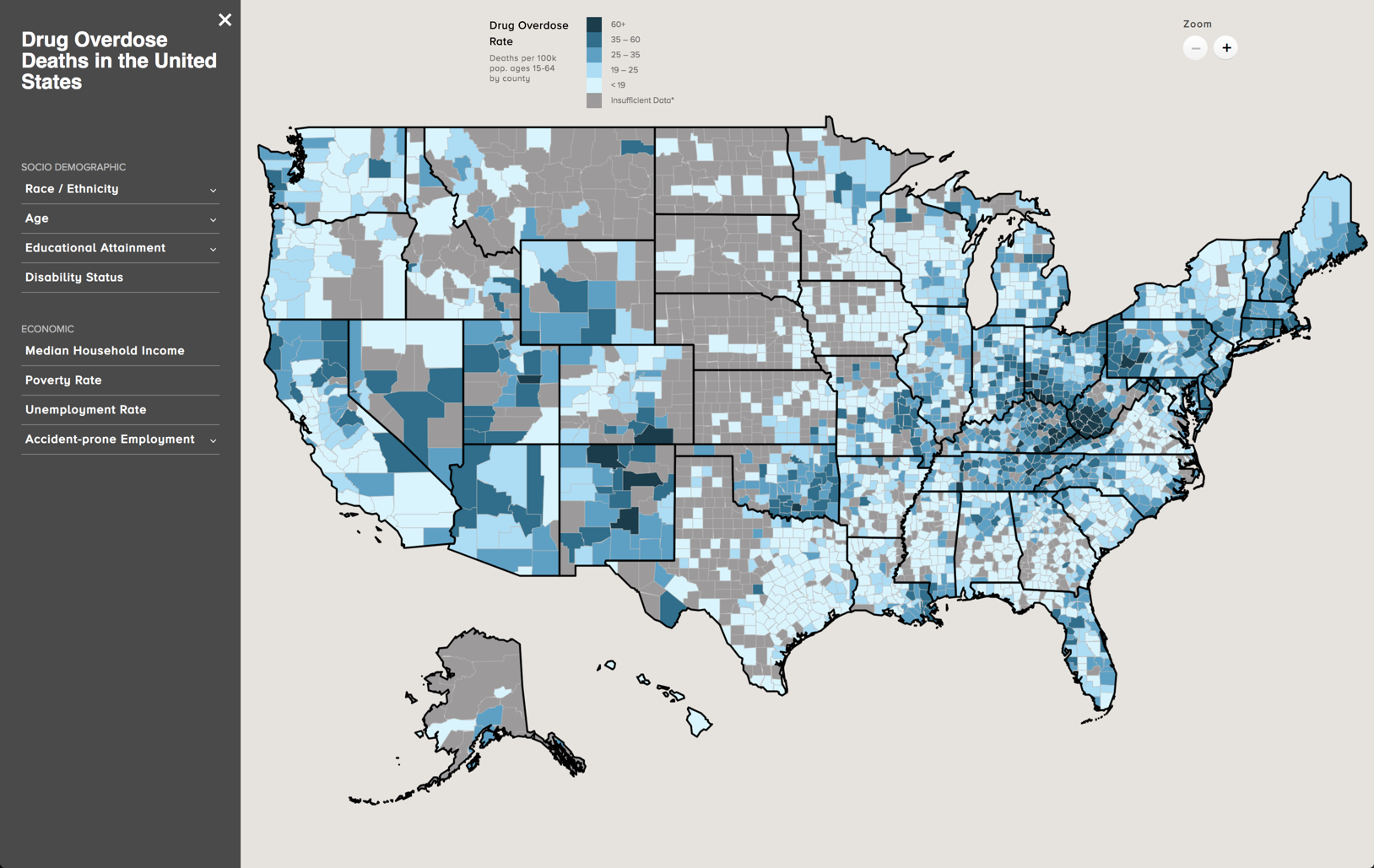Interactive Drug Overdose Map
There’s a fascinating resource available to track Opioid Overdose Statistics and different levels of usage. And it can be tracked anywhere in the United States.
Using data compiled by the United States Department of Agriculture’s Rural Drug Program and The University of Chicago NORC created an interactive map revealing every bit of information relating to opioid-related deaths imaginable.
This community assessment tool was devised as a means for seeing just how much the opioid crisis affects different regions and demographics – which helps in summoning resources to deal with the crisis.
Clicking on the map image below will open a new page with the interactive map.
Breakdown of opioid use and overdose by various factors
Understanding how the map works provides a real understanding for how the impact of opiates, based on a number of factors. They include:
- Opioid addiction and death rates.
- The location of these occurrences, which also breaks down local economies, ethnicities, educational level.
- Opioid use by age.
- Employment of those affected by opioids and unemployment rates as they match up with opioid use.
- Opioid and non-opioid overdoses.
- Opioid use on Native American reservations.
With data compiled from three main sources – CDC National Center for Health Statistics (NCHS) National Vital Statistics System (NVSS) Multiple Cause of Death File; U.S. Census Bureau, American Community Survey; and the Bureau of Labor Statistics Quarterly Census of Employment and Wages – this map is able to show hotspots where opioid activity takes place, giving an understanding of why it occurs and who is most at risk.
It also compares information from two time periods (2007-2011 and 2012-2016), which helps determine mortality rates from persons ages 15 to 64 and provides an accurate assessment for this mapping tool.
The USDA Rural Development program was created to provide economic opportunity through loans and grants to rural areas, helping to create jobs and assisting in improving the quality of life through addressing health, social, educational, housing, public safety and technology issues
For more than 75 years, the non-partisan NORC at the University of Chicago has collected data to help municipalities, nonprofits and businesses create fact-based decisions. NORC’s Walsh Central for Rural Health Analysis has taken complex issues and data to create overviews and solutions to various issues.
Rural America takes note of the opioid crisis
As seen with careful inspection of the map, the proliferation of opiates affects every geographic region and economic and ethnic group. In small towns across the country, some of which have been especially devastated by opioids, community leaders and rural influencers have taken note.
The High Plains/Midwest AG Journal addressed this issue in a recent article:
In small towns from the heartland to the coasts, there is a growing threat to economic prosperity in rural America: the misuse of prescription pain medicine, otherwise known as opioids, and other addictive substances. Our nation is in the midst of a crisis. While no corner of the country has gone untouched by this epidemic, rural communities like Garden Plain, a farm town of just 890 people in south central Kansas, have been particularly hard hit.
In October of last year, President Donald J. Trump declared war on the opioid epidemic and directed an all-hands team to respond with every available resource. With that call to action, Secretary of Agriculture Sonny Perdue ensured the United States Department of Agriculture is on the front lines of this crisis as a committed partner to rural communities.
As we carry out our core mission of increasing rural prosperity, the opioid epidemic and the broader issue of substance misuse in rural America is more than a health issue; this is a matter of rural prosperity that threatens the economic fabric of small towns across our country
To speak with one of our compassionate medical professionals, call All Opiates Detox at (800) 458-8130.


